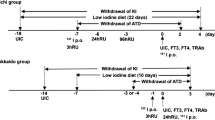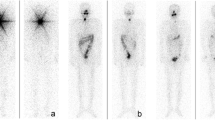Abstract
Objective
To explore the implementation of low-iodine diets by medical staff caring for patients with differentiated thyroid carcinoma prior to 131I therapy across 58 hospitals, and offer valuable insights for the development of guidelines on low-iodine diets.
Methods
Convenience sampling was utilized to conduct a survey among 163 medical staff members working in nuclear medicine departments across 58 tertiary hospitals using a self-designed questionnaire.
Results
Concerning the duration of the low-iodine diet prior to treatment, the medical staff’s recommendations were as follows: 58.28% suggested 2–4 weeks, 31.29% recommended more than 4 weeks, 9.2% opted for 7–13 days, and 1.23% favored less than 1 week. Regarding the timing of resuming a normal diet, the respondents’ recommendations ranged from immediately after treatment (1.84%) to 3 months post-treatment (8.58%), with intermediate recommendations of 2 h (8.58%), 24–48 h (14.11%), post-discharge (12.26%), and 1 month (42.94%). Furthermore, the surveyed medical staff unanimously recommended abstaining from seafood, with 90.8% also advising against the consumption of iodized salt, 91.41% recommending avoidance of iodine-containing medications, and 71.17% advising caution with moderately high-iodine foods. Notably, 75.46% of the medical staff evaluated patient compliance with the low-iodine diet. When patients failed to adhere to the diet preparation, 33.74% of healthcare workers chose to proceed with treatment. In terms of guidance sources, 96.93% of respondents relied on relevant guidelines, 66.26% referred to the literature, and 49.69% drew upon their clinical experience. During hospitalization, 58.28% of the medical staff continued to guide patients on the low-iodine diet, while only 8.59% provided such guidance after discharge. Notably, only 20.25% of the staff considered consulting the nutrition department.
Conclusion
This study underscored substantial variations in the duration and selection criteria for low-iodine diets, which were linked to a scarcity of standardized evaluations. Consequently, there is an urgent need for further research to establish detailed, practical, accessible, comprehensive, and dependable implementation programs for low-iodine diets.
Similar content being viewed by others
Data Availability
The data supporting the findings of this study are available within the article.
References
Bray F, Ferlay J, Soerjomataram I, Siegel RL, Torre LA, Jemal A. Global cancer statistics 2018: GLOBOCAN estimates of incidence and mortality worldwide for 36 cancers in 185 countries. CA Cancer J Clini. 2018;68(6):394–424.
Cao W, Chen HD, Yu YW, Li N, Chen WQ. Changing profiles of cancer burden worldwide and in China: a secondary analysis of the global cancer statistics 2020. Chin Med J (Engl). 2021;134(7):783–91.
**g W, Chengyu Y, Guowei L, Yuan W, Jie Z. Application of GM (1,1) model in predicting the incidence trend of thyroid cancer in China. J Modern Oncol. 2022;30(05):899–902.
Maxon HR, Thomas SR, Boehringer A, Drilling J, Sperling MI, Sparks JC, et al. Low iodine diet in I-131 ablation of thyroid remnants. Clin Nucl Med. 1983;8(3):123.
Padovani RP, Maciel RM, Kasamatsu TS, Freitas BC, Marone MM, Camacho CP, et al. Assessment of the effect of two distinct restricted iodine diet durations on urinary iodine levels (collected over 24 h or as a single-spot urinary sample) and Na(+)/I(-) symporter expression. Eur Thyroid J. 2015;4(2):99–105.
Nuclear Medicine Society of Chinese Medical Association. Guidelines for radioiodine therapy of differentiated thyroid cancer (2021 edition). Chin J Nucl Med Mol Imaging. 2021;41(4):218–41.
Herbert G, England C, Perry R, Whitmarsh A, Moore T, Searle A, et al. Impact of low iodine diets on ablation success in differentiated thyroid cancer: a mixed-methods systematic review and meta-analysis. Clin Endocrinol (Oxf). 2022;97(6):702–29.
Luster M, Aktolun C, Amendoeira I, Barczyński M, Bible KC, Duntas LH, et al. European perspective on 2015 American Thyroid Association management guidelines for adult patients with thyroid nodules and differentiated thyroid cancer: proceedings of an interactive international symposium. Thyroid. 2019;29(1):7–26.
Perros P, Boelaert K, Colley S, Evans C, Evans RM, Gerrard Ba G, et al. Guidelines for the management of thyroid cancer. Clin Endocrinol. 2014;81:1–122.
Pacini F, Basolo F, Bellantone R, Boni G, Cannizzaro MA, De Palma M, et al. Italian consensus on diagnosis and treatment of differentiated thyroid cancer: joint statements of six Italian societies. J Endocrinol Invest. 2018;41(7):849–76.
Pacini F, Fuhrer D, Elisei R, Handkiewicz-Junak D, Leboulleux S, Luster M, et al. 2022 ETA Consensus Statement: what are the indications for post-surgical radioiodine therapy in differentiated thyroid cancer? Eur Thyroid J. 2022;11(1): e210046.
Kang SW, Yap ZZ, Lee CR, Lee J, Jeong JJ, Nam KH, et al. Pattern of urine iodine excretion with low iodine diet during preparation for radioactive iodine ablation in patients with thyroid cancer. Head Neck. 2019;41(2):381–7.
Lee M, Lee YK, Jeon TJ, Chang HS, Kim BW, Lee YS, et al. Low iodine diet for one week is sufficient for adequate preparation of high dose radioactive iodine ablation therapy of differentiated thyroid cancer patients in iodine-rich areas. Thyroid. 2014;24(8):1289–96.
Dekker BL, Links MH, Muller Kobold AC, Swart-Busscher LG, Kars M, Bons JAP, et al. Low-iodine diet of 4 days is sufficient preparation for 131I therapy in differentiated thyroid cancer patients. J Clin Endocrinol Metab. 2022;107(2):e604–11.
Ying Z, Wei M, **uwei L, **aoxiao C, Haiyan W, Jianqiang W, et al. Dietary iodine intake among adult women in regions with high and appropriate drinking water iodine. Chin J Public Health. 2021;37(8):1250–3.
England CY, Moss L, Beasley M, Haupt-Schott I, Herbert G, Atkinson C. A survey of UK centres on low iodine diet recommendations prior to radioiodine ablation therapy for differentiated thyroid cancer. Eur Thyroid J. 2020;9(3):132–8.
Yi Y. Radiation dosimetry and radiation protection in clinical nuclear medicine procedures Fudan University. 2012.
ICRR. Limits for the intake of radionuclides by workers. ICRP publication 30. Oxford, UK: Pergamon press; 1979.
GB 26878-2011, National Food Safety Standard For Iodine Concentration in Edible Salt.
** L, ** C, Qiao R. Effect of normal iodized salt diet on urinary iodine concentration and iodine uptake rate in patients with differentiated thyroid cancer before 131I treatment. Chin J Nucl Med Mol Imaging. 2023;43(03):161–5.
Herbert G, Searle A, England CY, Ness A, Beasley M, Haupt-Schott I, et al. Experiences of low iodine diets in the treatment of differentiated thyroid cancer with radioactive iodine ablation therapy. Clin Nutr ESPEN. 2020;39:190–7.
Ju DL, Park YJ, Paik HY, Kim MJ, Park S, Jung KY, et al. Dietary evaluation of a low-iodine diet in Korean thyroid cancer patients preparing for radioactive iodine therapy in an iodine-rich region. Nurs Res Pract. 2016;10(2):167–74.
UK Low Iodine Diet Working Group. The low iodine diet [cited 23/07/2018]. 2018. Available from http://www.btf-thyroid.org/images/documents/Low_Iodine_Diet_Factsheet.pdf.
Yoo ID, Kim SH, Seo YY, Oh JK, O JH, Chung SK. The success rate of initial 131I ablation in differentiated thyroid cancer: comparison between less strict and very strict low iodine diets. Nucl Med Mol Imaging. 2012;46(1):34.
Chinese Medical Association Local Disease Branch, Chinese Nutrition Society, Endocrinology Branch of the Chinese Medical Association. Guidelines to iodine supplementation for Chinese residents. Bei**g: People’s Health Publishing House; 2018.
Luo H, Tobey A, Auh S, Cochran C, Behairy N, Merino M, et al. The utility of low-iodine diet in preparation for thyroid cancer therapy with radioactive iodine-a cohort study. Front Pharmacol. 2022;13: 791710.
**gjia C, Yong L, Juan X, Cenghua W, Chanhua Y. Relationship between urinary iodine level before 131I treatment and excellent response in differentiated thyroid carcinoma patients with low-to-intermediate risk. Chin J Nucl Med Mol Imaging. 2021;41(1):35–40.
Funding
This study was supported by the Nursing research Foundation funded by the First Affiliated Hospital of Chongqing Medical University (grant numbers HLJJ2021-05).
Author information
Authors and Affiliations
Corresponding authors
Additional information
Publisher's Note
Springer Nature remains neutral with regard to jurisdictional claims in published maps and institutional affiliations.
Rights and permissions
Springer Nature or its licensor (e.g. a society or other partner) holds exclusive rights to this article under a publishing agreement with the author(s) or other rightsholder(s); author self-archiving of the accepted manuscript version of this article is solely governed by the terms of such publishing agreement and applicable law.
About this article
Cite this article
Yi, Y., Zhu, Y., Wu, Y. et al. Investigation on low-iodine diet implementation by medical staff before radioactive iodine treatment for differentiated thyroid carcinoma. Ann Nucl Med (2024). https://doi.org/10.1007/s12149-024-01952-2
Received:
Accepted:
Published:
DOI: https://doi.org/10.1007/s12149-024-01952-2




